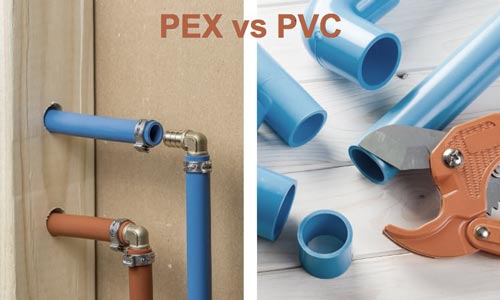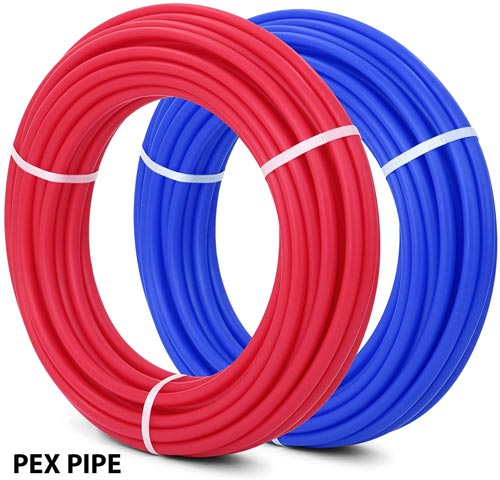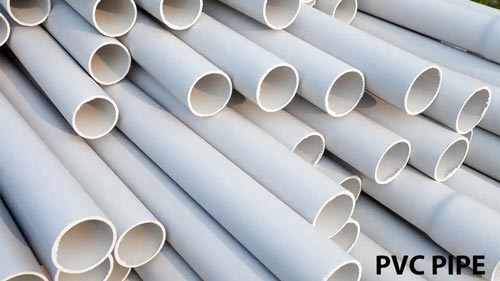Which pipe do you choose? PVC or PEX
When it comes to plumbing materials, there are a variety of options available. Two of the most popular materials used for piping systems are PEX (cross-linked polyethylene) and PVC (polyvinyl chloride). While both materials have their advantages, they also have some key differences that can make one better suited for a particular application. In this article, we'll take a closer look at the properties and advantages of PEX and PVC, and compare them to help you determine which is better for
your needs.

Table of Contents:
Introduction
What is PEX?
Advantages of PEX
What is PVC?
Advantages of PVC
Comparing PEX and PVC
Which is Better for Your Needs?
Conclusion
Introduction
Plumbing systems are an essential part of any building, whether it's a residential home, commercial building, or industrial facility. The pipes that make up the plumbing system are responsible for carrying water, waste, and other fluids throughout the building, and they must be able to withstand a variety of conditions and pressures. Two of the most commonly used materials for plumbing pipes are PEX and PVC. While both materials have their advantages, they also have some key differences that can make one better suited for a particular application.
What is PEX?
PEX is a type of plastic tubing that is commonly used for plumbing systems. It is made by cross-linking polyethylene molecules, which creates a more durable and flexible material than traditional polyethylene. PEX comes in a variety of colors and sizes, and it is often used for hot and cold water lines, radiant floor heating, and other applications.
Advantages of PEX
There are several advantages to using PEX in plumbing systems. One of the biggest advantages is its flexibility. PEX is much more flexible than PVC, which makes it easier to install in tight spaces and around corners. It is also less likely to break or burst in extreme temperatures, which can be a big advantage in areas with harsh weather conditions.
PEX is also resistant to corrosion and scale buildup, which can extend the lifespan of a plumbing system. It is also a quieter material than PVC, as it doesn't transmit sound as easily. Finally, PEX is generally more affordable than copper piping, which can be a big advantage for those on a budget.

What is PVC?
PVC is a rigid plastic material that is commonly used for piping systems. It is made by polymerizing vinyl chloride molecules, which creates a strong and durable material that is resistant to chemicals and abrasion. PVC comes in a variety of colors and sizes, and it is often used for drain, waste, and vent (DWV) piping systems, as well as industrial applications.
Advantages of PVC
There are several advantages to using PVC in plumbing systems. One of the biggest advantages is its strength. PVC is a rigid material that can withstand high pressures and temperatures, which makes it ideal for some industrial applications.
PVC is also resistant to chemicals and abrasion, which can make it a better choice for certain types of fluids or environments. It is also less likely to be affected by UV rays or other environmental factors that can degrade some other types of plastics. Finally, PVC is generally more affordable than other materials like copper or stainless steel, which can make it a good choice for those on a budget.

Comparing PEX and PVC
When comparing PEX and PVC, there are several factors to consider. One of the biggest differences between the two materials is their flexibility. PEX is much more flexible than PVC, which can make it easier to install in tight spaces or around corners. PVC, on the other hand, is a rigid material that is best suited for straight runs of pipe. Another important factor to consider is temperature resistance. PEX is less likely to break or burst in extreme temperatures, making it a good choice for areas with harsh weather conditions. PVC is also relatively temperature-resistant, but it can become brittle at very low temperatures. PEX is also resistant to corrosion and scale buildup, which can extend the lifespan of a plumbing system. PVC is also resistant to chemicals and abrasion, which makes it a good choice for some industrial applications.
Cost is another consideration. PEX is generally more affordable than copper piping, but it is usually more expensive than PVC. PVC is often the most cost-effective option, which can make it a good choice for those on a budget.
Finally, local building codes and regulations may impact your choice of material. Some areas have restrictions on the use of certain types of piping materials, so it's important to check with your local building department to ensure that you are using the appropriate material for your project.
Which is Better for Your Needs?
Ultimately, the choice between PEX and PVC will depend on a variety of factors. If you are looking for a flexible and durable material that is resistant to corrosion and scale buildup, PEX may be the best choice for you. If you need a strong and temperature-resistant material that is also resistant to chemicals and abrasion, PVC may be the better option.
Cost may also be a factor, as PVC is often the most affordable option. However, it's important to keep in mind that the cost of the material is just one part of the overall cost of a plumbing project. Installation costs, labor costs, and other factors can all impact the final cost of the project.
Finally, it's important to check with your local building department to ensure that you are using the appropriate material for your project. Local building codes and regulations may impact your choice of material, and it's important to comply with these regulations to ensure the safety and integrity of your plumbing system.
Conclusion
In conclusion, both PEX and PVC are popular materials for plumbing systems, but they have different properties and advantages depending on the application. PEX is generally more flexible and durable than PVC, making it easier to install and less likely to break or burst in extreme temperatures. PVC is a strong and cost-effective material that is resistant to chemicals and abrasion, making it a good choice for some industrial applications. Ultimately, the choice between PEX and PVC will depend on a variety of factors, including flexibility, temperature resistance, cost, and local building codes and regulations.